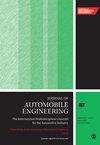Evaluation method with digital expert on the criticality of car-following scenarios for autonomous vehicles testing
IF 1.5
4区 工程技术
Q3 ENGINEERING, MECHANICAL
Proceedings of the Institution of Mechanical Engineers Part D-Journal of Automobile Engineering
Pub Date : 2024-04-27
DOI:10.1177/09544070241245484
引用次数: 0
Abstract
Evaluation of autonomous vehicles is one of the major challenges before they can be released. Due to the advantages in efficiency, cost, and safety, scenario-based simulation methods have recently received great attention. Even so, as the complexity and uncertainty exist in the real driving environment, the scenarios that autonomous vehicles may encounter are infinite. Therefore, it is necessary to classify simulation scenarios according to their criticality. It contributes to accelerating the evaluation processes. This paper presents a novel criticality evaluation method, based on a proposed Digital Expert, for car-following autonomous driving. The Digital Expert acts as the evaluator to evaluate the criticality of scenarios depending on their driving performance. Driving performance refers to the achieved degree of driving intentions. Firstly, a Digital Expert is established as the evaluator for the criticality of the scenario using the inverse reinforcement learning method. Then, based on the fact that the intention of Digital Expert is to maximize its internal reward function, the reward function is used to evaluate driving performance. Finally, calculating the criticality of the car-following scenario according to the mapping relationship between driving performance and criticality. Using the driving data in the NGSIM data set, this paper generates two groups of simulated car-following scenarios and evaluates the criticalities of the two scenarios. The experimental results show that the proposed criticality evaluation method can reasonably evaluate the criticality of car-following scenarios.利用数字专家对自动驾驶汽车测试中汽车跟随场景的关键性进行评估的方法
在自动驾驶汽车发布之前,对其进行评估是一项重大挑战。由于在效率、成本和安全性方面的优势,基于场景的模拟方法最近受到了极大关注。尽管如此,由于真实驾驶环境存在复杂性和不确定性,自动驾驶汽车可能遇到的场景是无限的。因此,有必要根据关键程度对模拟场景进行分类。这有助于加速评估过程。本文提出了一种基于数字专家的新型临界度评估方法,适用于汽车跟随式自动驾驶。数字专家作为评估者,根据驾驶性能来评估情景的临界度。驾驶性能是指驾驶意图的实现程度。首先,利用反强化学习方法将数字专家确立为场景关键性的评估者。然后,基于数字专家的意图是最大化其内部奖励函数这一事实,利用奖励函数来评估驾驶性能。最后,根据驾驶性能与临界值之间的映射关系计算跟车场景的临界值。本文利用 NGSIM 数据集中的驾驶数据,生成了两组模拟跟车场景,并对两种场景的临界度进行了评估。实验结果表明,本文提出的临界度评价方法可以合理地评价汽车追尾情景的临界度。
本文章由计算机程序翻译,如有差异,请以英文原文为准。
求助全文
约1分钟内获得全文
求助全文
来源期刊

CiteScore
4.40
自引率
17.60%
发文量
263
审稿时长
3.5 months
期刊介绍:
The Journal of Automobile Engineering is an established, high quality multi-disciplinary journal which publishes the very best peer-reviewed science and engineering in the field.
 求助内容:
求助内容: 应助结果提醒方式:
应助结果提醒方式:


